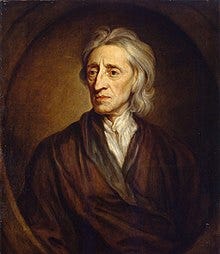John Locke and the problems of technocratic rule
Certain ideas about land and population seem to guide our present insanity
In my last paid-for piece here, I discussed how the Conservative Party in government is acting more like a part of the business supply chain than a government in its response to employer demands for more foreign workers.
Basically: the Tories in 2023 seem to regard themselves, not as representatives of the people who elected them, but as providers or producers of a willing and able workforce for employers at whatever terms and conditions the employers are offering.
And they see a quick fix to meet demand in liberalising immigration laws, thereby ramping up ‘production’ and facilitating the record incomings evident in today’s immigration numbers. Net migration hit a new record of 606,000 in 2022, consisting of 1.2 million people arriving in the UK versus 557,000 leaving (note however it wasn’t as big as we had been led to believe, suggesting a little opinion management from the government).
This approach of facilitating new records in incomings has no feeling for any limits in population and population growth, not to mention the social, cultural and political change that will be stimulated by such a large and seemingly continuous influx of people into a relatively small piece of land.
However, here I want to talk a bit more about that latter aspect: land, and the way our ruling class of politicians, civil servants, experts, Establishment journalists and the rest treats it, like population, as something effectively without limits: despite the obvious contrary evidence.
From the research I’ve been doing for my next book, The Progress Factory, the most important progenitor of this attitude seems to be John Locke, a philosopher in post-Restoration England who laid some of the foundations for modern liberalism both in the United States and Britain.
